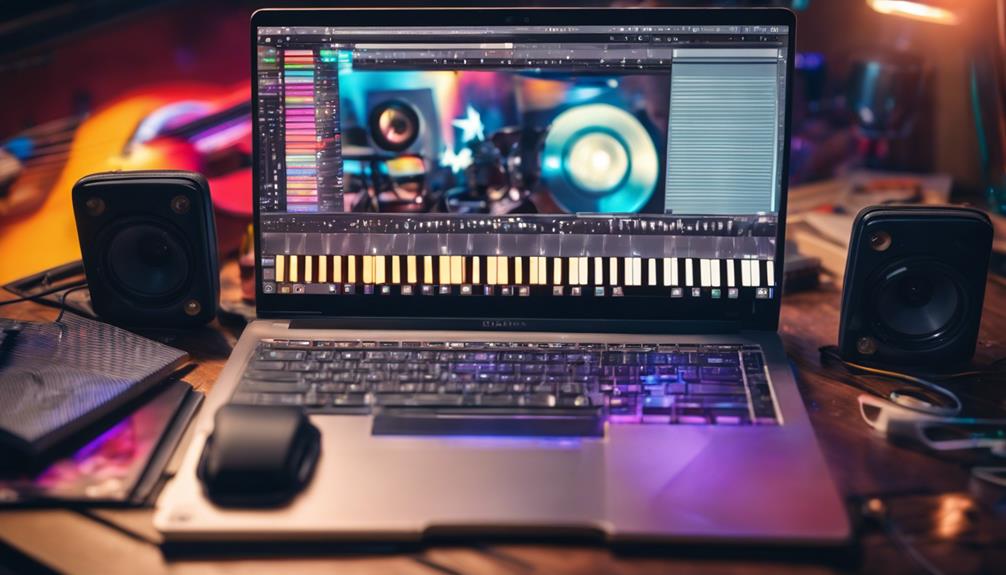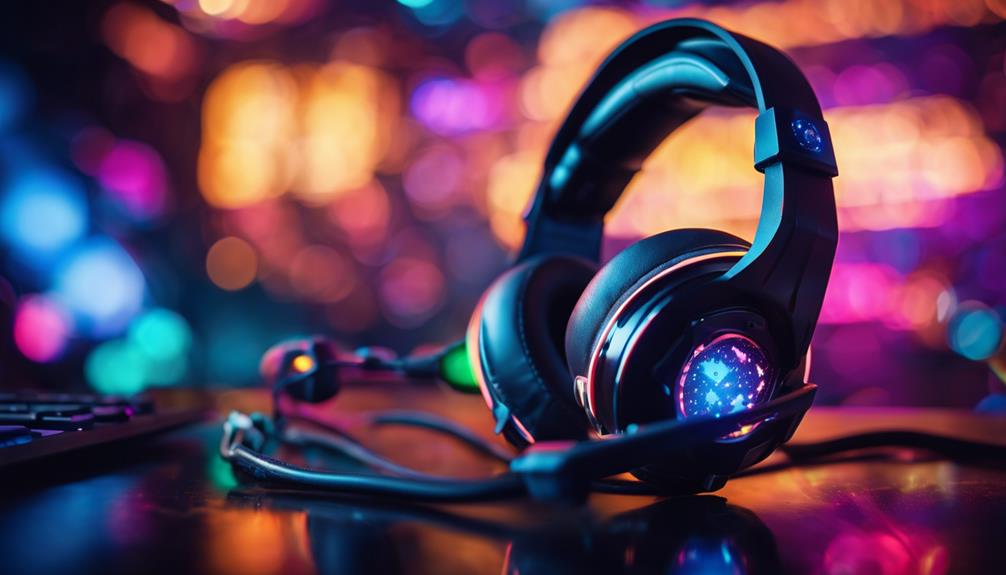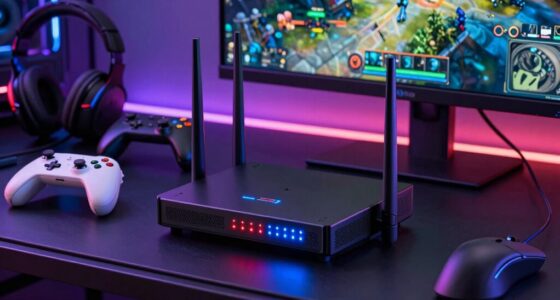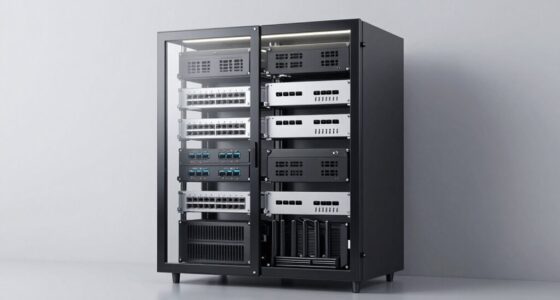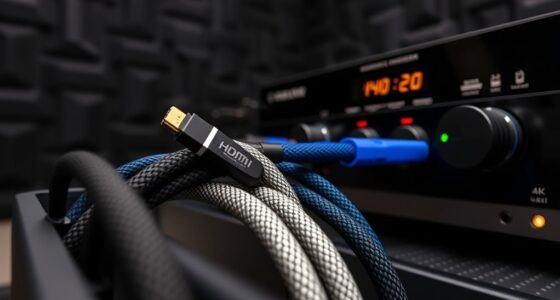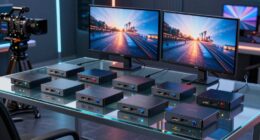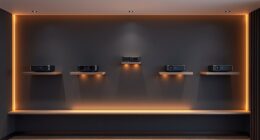When it comes to the best laptops for music production in 2025, I've narrowed it down to 15 models that excel in power and performance. The Acer Aspire 3 A315 offers a reliable AMD processor and impressive battery life, while the Apple MacBook Air's M3 chip combines portability with powerful capabilities. For those needing more storage, the HP Notebook with 32GB of RAM and a 1TB SSD stands out. Additionally, the Acer Nitro 5 provides gaming-level power that supports high-demand audio software. Each laptop has its strengths, and there's more to take into account as you choose the ideal device for your creative process.
Key Takeaways
- Look for laptops with powerful processors like AMD Ryzen 5 or Intel Core i7 for optimal music production performance.
- Prioritize at least 16GB of RAM to handle multiple applications and plugins smoothly during music production.
- Choose models with ample storage, preferably 1TB SSD, to accommodate large audio libraries and projects.
- Select a lightweight and portable laptop, such as the Apple MacBook Air, for easy transport to gigs and studios.
Acer Aspire 3 A315-24P Slim Laptop

The Acer Aspire 3 A315-24P Slim Laptop stands out as an excellent choice for budding music producers thanks to its impressive 11-hour battery life and lightweight design, making it easy to work on the go.
With its 15.6 Full HD IPS display and AMD Ryzen 3 7320U Quad-Core processor, I find it capable of handling most music production tasks smoothly.
The 8GB LPDDR5 RAM is suitable for multitasking, while the 128GB NVMe SSD provides decent storage for software and projects, though it may feel limited for extensive libraries.
Improved thermal management guarantees the laptop runs efficiently during longer sessions.
However, I've noticed some users mention challenges with speaker quality and Windows 11 S Mode, which could affect overall usability for music production.
Best For: The Acer Aspire 3 A315-24P Slim Laptop is best for students and professionals seeking a portable and efficient device for everyday tasks and light music production.
Pros:
- Lightweight design makes it easy to carry for on-the-go productivity.
- Impressive battery life of up to 11 hours supports extended usage without frequent charging.
Cons:
- Limited 128GB SSD storage may not suffice for users with extensive software and project libraries.
- Speaker quality is reported to be poor, which could impact multimedia tasks.
HP 15.6 Anti-Glare HD Laptop

With its impressive 16GB of RAM and long battery life, the HP 15.6 Anti-Glare HD Laptop stands out as an excellent choice for music producers seeking reliable performance on the go.
Weighing just 3.83 lbs, it's portable enough for studio sessions or remote work.
The Intel Pentium N200 processor, with four cores and a maximum speed of 3.7 GHz, guarantees smooth multitasking.
The laptop features a 15.6-inch anti-glare display, providing clear visuals even in bright environments.
With a battery life averaging 9.75 hours, it keeps up with long production sessions.
Connectivity options, including USB Type-C and HDMI, enhance its versatility.
Overall, this laptop balances performance and portability, making it a solid option for music production.
Best For: Music producers and professionals seeking a portable and reliable laptop for on-the-go performance and multitasking.
Pros:
- High RAM: 16GB DDR4 RAM ensures smooth multitasking.
- Long Battery Life: Up to 11 hours of battery life supports extended work sessions.
Cons:
- Limited Storage: 128GB SSD may not be sufficient for large music files.
- Integrated Graphics: Lacks dedicated graphics for intensive graphic tasks.
Apple 2025 MacBook Air 13-inch Laptop with M3 Chip

For musicians seeking a powerful yet portable option, the Apple 2025 MacBook Air 13-inch with the M3 chip delivers exceptional performance and stunning display quality, perfect for music production on the go.
With its 13.6-inch Liquid Retina Display, I can enjoy vibrant colors and sharp text, enhancing my workflow.
The M3 chip features an 8-core CPU and a 10-core GPU, allowing me to multitask seamlessly between demanding applications like Logic Pro and Adobe Creative Cloud.
Weighing less than a pound, this laptop is highly portable, which is essential for my travels.
However, I do wish it had more RAM and storage in the base model, and the limited ports can be inconvenient at times.
Overall, it's a solid choice for music producers.
Best For: Musicians and creatives seeking a powerful, portable laptop for music production and multitasking on the go.
Pros:
- Exceptional performance with the M3 chip, ideal for demanding applications.
- Stunning 13.6-inch Liquid Retina Display for vibrant colors and sharp text.
Cons:
- Base model may lack sufficient RAM and storage for some users.
- Limited port selection can require additional dongles for connectivity.
HP Notebook Laptop (15.6 HD Touchscreen, Intel Core i3, 32GB RAM, 1TB SSD)

Equipped with a powerful Intel Core i3 processor and a generous 32GB of RAM, this HP Notebook Laptop is an excellent choice for aspiring music producers who need reliable performance and ample storage for their projects.
With a spacious 1TB SSD, I can quickly boot up my software and transfer large audio files without delays.
The 15.6 HD touchscreen provides decent visuals, although the resolution mightn't impress everyone.
Weighing just 3.75 pounds, it's portable enough for on-the-go sessions.
While users have noted concerns about build quality and screen glare, the overall performance remains solid.
Additionally, Windows 11 enhances usability with its new features.
Overall, this laptop offers a good balance of power and affordability for music production.
Best For: This HP Notebook Laptop is best for aspiring music producers seeking reliable performance and ample storage for their projects.
Pros:
- Enhanced performance with 32GB RAM and 1TB SSD for fast boot-up and data transfer.
- Portable design at 3.75 pounds, making it suitable for on-the-go sessions.
Cons:
- Concerns about build quality and screen glare reported by users.
- HD touchscreen resolution may not meet everyone's visual expectations.
Acer Nitro 5 Gaming Laptop (AN515-55-53E5)

The Acer Nitro 5 Gaming Laptop (AN515-55-53E5) stands out for its powerful Intel Core i5 processor and NVIDIA RTX 3050 graphics, making it an excellent choice for music producers who also enjoy gaming and need robust performance for demanding software.
With 8GB of DDR4 RAM, which can be upgraded to 32GB, and a 256GB NVMe SSD, this laptop provides ample speed and storage for music projects.
The 15.6-inch FHD display with a 144Hz refresh rate guarantees smooth visuals.
However, be mindful of its limited battery life, averaging 1-2 hours under heavy use.
The laptop also features Intel Wi-Fi 6 and various connectivity options, making it versatile for both music production and gaming needs.
Best For: The Acer Nitro 5 Gaming Laptop (AN515-55-53E5) is best for casual gamers and music producers seeking a balance of performance and affordability.
Pros:
- Pros:
- Powerful Intel Core i5 processor and NVIDIA RTX 3050 for excellent gaming and productivity performance.
- Expandable RAM and storage options allow for enhanced capabilities as needs grow.
Cons:
- Cons:
- Limited battery life, averaging only 1-2 hours under heavy use, can be a drawback for on-the-go users.
- Loud fan noise during heavy usage may be distracting in quiet environments.
Lenovo IdeaPad 1 Student Laptop (20GB RAM, 1TB SSD, Windows 11)

With 20GB of RAM and a 1TB SSD, the Lenovo IdeaPad 1 Student Laptop offers ample power and storage, making it an excellent choice for music production enthusiasts.
The Intel Celeron N4500 processor, while not the most powerful, can reach turbo speeds of up to 2.8 GHz, handling basic music production tasks effectively.
Its 15.6-inch FHD display provides a clear workspace, and the lightweight design at 3.42 pounds makes it portable.
Plus, Windows 11 enhances the user experience with improved functionality.
Connectivity options, including USB and HDMI ports, allow for easy integration with other devices.
However, users should note its limitations with heavy internet use and the lack of an optical drive.
Overall, it's a reliable option for budding producers.
Best For: The Lenovo IdeaPad 1 is best for students and casual users seeking a reliable, budget-friendly laptop for basic tasks such as web browsing and document editing.
Pros:
- Ample storage with a 1TB SSD for quick boot-up and data access.
- Lightweight design at 3.42 pounds for easy portability.
Cons:
- Limited processing power with the Intel Celeron N4500, making it less suitable for heavy applications.
- Issues with heavy internet usage, potentially affecting performance.
Lenovo 15.6 Laptop with 16GB RAM and 1TB SSD

For musicians seeking a reliable and versatile laptop, the Lenovo 15.6 model, featuring 16GB RAM and a 1TB SSD, offers the performance needed to handle music production software efficiently.
Its 15.6-inch FHD display guarantees clear visuals, while the lightweight design, at just 3.75 lbs, makes it portable for on-the-go sessions. Powered by an Intel Celeron N4500 processor, it supports multitasking, although it may struggle with intensive tasks.
The built-in Dolby audio speakers enhance sound quality, making it easier to produce tracks.
Connectivity options include USB-C, HDMI, and Ethernet, allowing you to connect various devices easily.
Despite mixed reviews, this Lenovo model provides solid performance for everyday music production needs, making it a practical choice for aspiring musicians.
Best For: Musicians and everyday users seeking a portable laptop with sufficient performance for music production and multitasking.
Pros:
- Lightweight and portable design at just 3.75 lbs, ideal for on-the-go use.
- Large storage capacity with a 1TB SSD, providing ample space for music files and software.
Cons:
- Intel Celeron N4500 processor may struggle with more intensive tasks and software.
- Mixed customer reviews with an average rating of 3.8/5, indicating potential reliability concerns.
HP Chromebook 14 Laptop (14a-na0021nr)

Ideal for music producers on a budget, the HP Chromebook 14 (14a-na0021nr) combines portability and solid performance, making it a reliable choice for creating and editing tracks on the go.
It features a 14-inch HD display and is powered by an Intel Celeron N4000 processor, which is ideal for light music production tasks. With 4 GB of RAM and 32 GB of eMMC storage, it offers decent multitasking capabilities, though you may want to use cloud storage for larger projects.
The battery life is impressive, lasting up to 13.5 hours, allowing for extended sessions without needing a charge.
Weighing just 3.24 lbs, it's easy to transport, making it perfect for on-the-move music creators.
Best For: The HP Chromebook 14 (14a-na0021nr) is best for budget-conscious music producers seeking a portable device for light music production tasks.
Pros:
- Long battery life of up to 13.5 hours enables extended sessions without frequent charging.
- Lightweight design (3.24 lbs) makes it easy to transport for on-the-go creators.
Cons:
- Limited storage of 32 GB eMMC may require the use of cloud storage for larger projects.
- Intel Celeron N4000 processor is not suitable for heavy-duty music production tasks or software.
Lenovo IdeaPad Laptop with AMD Ryzen 5 5500U

The Lenovo IdeaPad Laptop with the AMD Ryzen 5 5500U is perfect for music producers seeking powerful performance and portability, thanks to its impressive 40GB of memory and lightweight design.
With a 15.6-inch FHD anti-glare display and AMD Radeon Graphics, it guarantees clear visuals while working on intricate projects. The Ryzen 5 processor outperforms many in its class, offering speeds up to 4.0 GHz, which is essential for music production software.
The 1TB PCIe NVMe SSD provides ample storage for large audio files, while the long-lasting battery can last up to 9 hours, making it reliable for on-the-go sessions.
However, some users report an average battery life of 4 hours, indicating variability. Overall, it's a strong contender for any serious music producer.
Best For: The Lenovo IdeaPad Laptop with AMD Ryzen 5 5500U is best for music producers who need a powerful, portable device with ample memory and storage for their projects.
Pros:
- High performance with AMD Ryzen 5 5500U, outperforming many competitors.
- Large 40GB DDR4 memory allows for seamless multitasking and running demanding software.
Cons:
- Some users report a lower average battery life of about 4 hours, indicating variability.
- Mixed reviews on video quality, particularly regarding screen contrast.
Lenovo IdeaPad 1 Student Laptop (15.6 FHD, Intel Dual Core, 12GB RAM, 512GB SSD)

With its lightweight design and powerful 12GB RAM, the Lenovo IdeaPad 1 is a great option for students enthusiastic to plunge into music production without breaking the bank.
The 15.6-inch FHD display provides crisp visuals, while the Intel Celeron N4500 processor, featuring a turbo speed of up to 2.8 GHz, supports basic music production tasks. Its 512GB SSD guarantees fast boot-up and data transfer, aiding in efficient multitasking.
Weighing just 3.42 pounds, it's portable for on-the-go use.
However, some users report performance issues and keyboard functionality concerns.
Overall, the Lenovo IdeaPad 1 is a solid choice for budget-conscious students looking to start their music production journey, though it may not satisfy everyone's performance expectations.
Best For: Budget-conscious students looking to begin their music production journey without a hefty investment.
Pros:
- Lightweight design makes it easy to carry for on-the-go use.
- 12GB RAM provides ample multitasking capabilities for basic tasks.
Cons:
- Some users report performance issues, including slowness.
- Keyboard functionality concerns have been noted by a few users.
Acer Predator Helios Neo 16 Gaming Laptop (PHN16-71-76H5)

Featuring a powerful Intel Core i7 processor and NVIDIA GeForce RTX graphics, the Acer Predator Helios Neo 16 is designed for music producers who demand high performance for multitasking and creative workloads.
With its 16GB DDR5 RAM and 512GB PCIe Gen 4 SSD, I can easily run multiple applications simultaneously without any lag.
The 16-inch WUXGA display offers a crisp resolution of 1920 x 1200 pixels, ideal for detailed editing tasks.
While the battery lasts around 3-4 hours under casual use, it's not the best for extended sessions, especially under heavy loads.
However, the robust cooling system keeps the laptop quiet even during intense tasks.
Overall, it's a strong choice for those looking for power and performance at a reasonable price.
Best For: The Acer Predator Helios Neo 16 is best for gamers and content creators who need a powerful and efficient laptop for multitasking and high-performance applications.
Pros:
- High-performance Intel Core i7 processor and NVIDIA GeForce RTX 4060 graphics for smooth gaming and content creation.
- Upgradeable RAM and storage options allow for enhanced performance and longevity.
Cons:
- Limited battery life, averaging only 3-4 hours during casual use and about 1 hour under gaming load.
- Heavier build at 5.73 pounds may not be ideal for portability.
Acer Aspire Go 15 Slim Laptop (AG15-31P-3947)

For budding music producers seeking a reliable and lightweight laptop, the Acer Aspire Go 15 Slim offers impressive performance with its Intel Core i3 processor and 8GB of RAM, making it ideal for handling everyday tasks and music software efficiently.
The 15.6-inch Full HD IPS display provides vibrant visuals, while the 128GB Universal Flash storage guarantees quick access to files.
Weighing just 3.86 pounds, it's portable enough for on-the-go production. The extended battery life supports long sessions without frequent recharging.
Connectivity options are robust, featuring USB Type-C and HDMI 2.1 ports, along with Wi-Fi 6 for seamless internet access.
However, some users may find Windows 11 in S Mode limiting, particularly when multitasking with numerous browser tabs.
Best For: Budding music producers and students looking for a lightweight laptop that efficiently handles everyday tasks and music software.
Pros:
- Impressive performance with Intel Core i3 processor and 8GB RAM for multitasking.
- Vibrant Full HD IPS display enhances visual experience for music production.
Cons:
- Windows 11 in S Mode may feel restrictive for users needing more software flexibility.
- Performance may lag when multitasking with multiple browser tabs open.
Lenovo IdeaPad 1 14 Laptop

The Lenovo IdeaPad 1 14 Laptop is an excellent choice for students and casual users seeking a lightweight device for basic music production tasks, thanks to its impressive 10-hour battery life and portable design.
Weighing just 3.09 lbs, it's easy to carry around, making it perfect for on-the-go creativity. The 14.0 HD display and Intel Celeron N4020 processor provide decent performance for everyday tasks like web browsing and streaming.
However, with only 4GB of RAM and 64GB of storage, you might experience slow speeds, especially with Windows 11 in S mode. While the keyboard isn't ideal for extended typing, many users appreciate the long battery life.
Overall, it's suitable for light music production without demanding extensive resources.
Best For: Students and casual users looking for a lightweight laptop for basic tasks and light music production.
Pros:
- Long battery life of up to 10-15 hours, ideal for on-the-go use.
- Lightweight design at just 3.09 lbs, making it portable and easy to carry.
Cons:
- Limited 4GB RAM and 64GB storage can lead to slow speeds, especially in Windows 11 S mode.
- Keyboard quality is hard plastic, which may be uncomfortable for extended typing sessions.
Acer Aspire 3 Spin 14 Convertible Laptop (A3SP14-31PT-37NV)

With its 360° convertible design and responsive touchscreen, the Acer Aspire 3 Spin 14 is an ideal choice for music producers who need versatility and portability in their workflow.
It boasts a 14-inch IPS touch display with a resolution of 1920 x 1200, ensuring vibrant visuals. The Intel Core i3-N305 processor runs at 3.8 GHz, supported by 8GB LPDDR5 RAM and a 128GB NVMe SSD, providing ample power for multitasking.
Weighing only 3.4 lbs, this laptop is easy to carry around. The full-USB Type-C port and Wi-Fi 6 connectivity enable seamless integration with other devices.
While customer ratings average 4.6 out of 5, some users noted minor issues like light bleeding. Overall, it offers solid performance at an accessible price point.
Best For: Music producers and professionals seeking a versatile and portable laptop for their workflow.
Pros:
- Responsive 14-inch IPS touchscreen with vibrant visuals, ideal for creative tasks.
- Lightweight design at 3.4 lbs, making it easy to transport for on-the-go use.
Cons:
- Reports of light bleeding on the screen, which may affect viewing experience.
- Slower startup times noted by some users could impact efficiency.
Dell Inspiron 3000 Series 3535 Laptop

Featuring a powerful AMD Ryzen 5 processor and 16 GB of RAM, the Dell Inspiron 3000 Series 3535 Laptop is ideal for music production enthusiasts seeking reliable performance.
With a 15.6-inch FHD touchscreen, I find the display vibrant, making it easy to navigate music software. The 512 GB SSD provides ample storage for large audio files, and Windows 11 Home guarantees I've access to the latest features.
Weighing just 3.59 pounds, it's portable enough for studio sessions or on-the-go production. However, some users have mentioned the absence of a backlit keyboard, which could be a downside in low-light environments.
Overall, this laptop balances performance and usability, making it a solid choice for music creators looking for efficiency in their workflow.
Best For: Music production enthusiasts seeking a reliable and portable laptop for their creative workflow.
Pros:
- Powerful performance with AMD Ryzen 5 processor and 16 GB of RAM, suitable for running demanding music software.
- Vibrant 15.6-inch FHD touchscreen enhances usability and navigation through music production tools.
Cons:
- Lack of a backlit keyboard may be inconvenient in low-light settings.
- Initial Wi-Fi card issues reported by some users, which could affect connectivity.
Factors to Consider When Choosing Lapfor Music Production

When choosing a laptop for music production, I focus on several key factors to guarantee it meets my needs.
The processor performance, RAM capacity, and storage options are essential for smooth workflow and quick loading times.
Additionally, I consider display quality and port selection to enhance my overall production experience.
Processor Performance Requirements
Choosing the right processor is crucial for achieving optimal performance in music production, as it directly impacts how efficiently you can handle multiple tracks and effects. I recommend looking for a processor with at least 4 cores and a clock speed of 3.0 GHz or higher. This setup guarantees that your laptop can manage demanding tasks without lagging. For peak performance, consider higher-end CPUs like the Intel Core i7 or AMD Ryzen 7, which excel at running intensive digital audio workstations (DAWs) and plugins.
Another important factor is multi-threading capability. This feature allows your processor to handle simultaneous audio inputs and outputs, which is essential during recording sessions. Additionally, processors with faster cache memory, such as an L3 cache of 8MB or more, help reduce latency issues during real-time audio processing and playback of high-quality samples.
Lastly, choose a processor that supports higher RAM capacities—16GB or more is preferable. This enables smoother multitasking and better management of complex projects, guaranteeing that you can work effectively with numerous virtual instruments and effects without experiencing slowdowns.
RAM Capacity Importance
RAM capacity plays an essential role in music production, as it directly affects how smoothly I can run multiple audio tracks and plugins simultaneously. For most digital audio workstations (DAWs), I recommend at least 16GB of RAM. This amount is usually sufficient for handling complex projects. However, if I'm delving into professional-level production, where extensive libraries and virtual instruments come into play, going for 32GB or more is ideal.
Insufficient RAM can lead to frustrating slowdowns or crashes, especially when working with resource-heavy plugins or high-resolution audio files. Such issues can disrupt my workflow and hinder creativity. Upgrading RAM not only enhances performance but also improves load times for software and samples. This upgrade allows quicker access to sounds, which can greatly reduce downtime during the production process.
Additionally, I can't overlook the speed of RAM, measured in MHz, as higher speeds facilitate faster data transfer rates. This improvement means better overall system responsiveness during intensive tasks, which is vital when I'm fully immersed in a project.
Ultimately, investing in adequate RAM capacity guarantees a smoother, more efficient music production experience.
Storage Speed and Size
Considering storage speed and size is vital for optimizing my music production workflow, as it directly impacts how efficiently I can manage software and audio files.
For music production, I've found that a minimum of 256GB SSD storage is necessary to hold software, plugins, and audio files. However, I prefer 512GB or more, especially for larger projects.
Faster SSDs, particularly PCIe NVMe drives, dramatically reduce load times and enhance responsiveness during recording and playback. This speed is essential when I'm working with multiple tracks and plugins simultaneously.
I also make use of external storage options, like USB 3.0 or Thunderbolt drives, which provide easy archiving of projects and access to extensive sample libraries without bogging down my laptop's performance.
To safeguard against data loss, I regularly back up my projects to an external drive or cloud storage. This practice not only protects my work but also guarantees a smooth workflow continuity.
Display Quality and Resolution
A high-quality display is crucial for my music production setup, as it directly impacts my ability to edit audio tracks and navigate software efficiently.
I always look for a Full HD resolution (1920 x 1080 pixels) because it provides the clarity needed to see fine details in waveforms and MIDI notes. Additionally, I prefer laptops with IPS technology, which enhances color accuracy and viewing angles. This feature allows me to view my work without distortion, whether I'm sitting directly in front of the screen or at an angle.
Screen size also matters; I find that a larger display, like 15.6 inches or more, makes multitasking much easier. I can have multiple software windows open at once, which streamlines my workflow.
Brightness levels are another consideration; I aim for displays with at least 250 nits to guarantee visibility in different lighting conditions, especially in studio environments.
Port Selection and Connectivity
Port selection and connectivity play an essential role in my music production setup, as they determine how easily I can connect important peripherals and enhance my workflow.
I always look for laptops with multiple USB ports, especially USB Type-C and USB 3.0, since these accommodate a range of audio interfaces, MIDI controllers, and external storage devices. Having HDMI or DisplayPort options is also critical for connecting to external monitors; this setup greatly boosts my productivity by providing extra screen space for mixing and editing.
Another feature I prioritize is Thunderbolt 4 ports for faster data transfer speeds, which allows for seamless connections with high-performance audio interfaces and other peripherals. Built-in wireless connectivity options, like Wi-Fi 6, guarantee stable and fast connections for online collaboration and accessing cloud storage during my production sessions.
Lastly, I make sure the laptop has headphone/microphone combo jacks or dedicated audio ports, as these facilitate quick connectivity for headphones and microphones, important for recording and monitoring audio.
Battery Life Considerations
Maximizing battery life is essential for my music production, especially during long sessions away from power outlets. When choosing a laptop, I find that battery life can greatly impact my workflow.
Many laptops offer average battery life ranging from 3 to 11 hours, but this can vary based on usage and specifications. High-performance models, equipped with powerful processors and dedicated graphics, often struggle, yielding only 1-4 hours under heavy conditions like real-time audio processing.
I prefer laptops with energy-efficient processors and battery-saving modes, as these features can extend my usage time considerably. I've noticed that some laptops can achieve up to 18 hours during lighter tasks, which is a game-changer for longer projects. Fast charging capabilities are another feature I prioritize, allowing me to quickly recharge between sessions and minimize downtime.
Ultimately, I recommend evaluating how you'll use the laptop. If you plan to work in mobile environments, focusing on battery life will guarantee I have the flexibility I need to create without interruptions. Balancing performance with efficient energy consumption is key for my music production needs.
Weight and Portability Factors
Choosing the right laptop for music production hinges on weight and portability, which can greatly impact my ability to create on the go. With laptops typically ranging from 2.5 to 5.5 pounds, weight is vital in determining how easily I can transport my gear. Ideally, I look for a lighter model, under 4 pounds, especially when traveling for gigs or collaborations.
Additionally, the dimensions matter; a slimmer profile, around 0.7 inches thick, allows my laptop to fit comfortably in my bag without adding bulk. However, when it comes to studio sessions, I understand that achieving a balance between weight and performance is important. Laptops that weigh over 4.5 pounds may offer better specifications, but they can quickly become cumbersome during travel.
Portability isn't solely about weight; I also consider the build quality. A sleek design that can withstand the rigors of travel is important, as I need a laptop that can house essential music production software while remaining durable.
Operating System Compatibility
When I'm selecting a laptop for music production, the operating system plays a significant role in determining which software I'll be able to effectively use. Many industry-standard programs are optimized for specific operating systems like Windows or macOS, so it's essential to take this compatibility into account.
Windows, particularly the 64-bit versions, supports a wide array of digital audio workstations (DAWs) and plugins. This flexibility is important for producers who rely on various tools to create their music.
On the other hand, macOS is known for its performance and stability, making it a popular choice among professionals. Its seamless integration with software like Logic Pro and strong support for audio interfaces makes it appealing for serious music production.
I've also noticed that some software might have limited functionality on certain OS versions. Thus, checking compatibility before making a purchase is critical.
In some cases, I might even need to take into account dual-boot setups or virtual machines to run specific software that's not natively supported on my chosen operating system.
Ultimately, understanding these factors can help guarantee I'm making the best choice for my music production needs.
Frequently Asked Questions
What Specifications Are Crucial for Music Production Laptops?
When choosing a laptop for music production, I focus on a powerful processor, ample RAM, and fast storage. These specs guarantee smooth performance, quick loading times, and the ability to handle multiple tracks without lag.
How Much RAM Is Ideal for Music Production?
I've found that 16GB of RAM is often the sweet spot for music production, allowing me to run multiple plugins smoothly. Curiously, 70% of producers prefer at least this amount for ideal performance in their projects.
Can I Use a Chromebook for Music Production?
I've tried using a Chromebook for music production, but it's limited. While it can handle basic tasks, I've found it struggles with more demanding software and plugins. A more powerful laptop is often necessary.
Is Battery Life Important for Music Production Laptops?
Absolutely, battery life's essential for my music production. I often work on the go, and a reliable battery means I can create without worrying about finding an outlet or losing my progress mid-session.
Are Gaming Laptops Suitable for Music Production Tasks?
Like a chameleon adapting to its environment, I've found gaming laptops can be great for music production. They offer powerful processors and ample RAM, making them suitable for handling demanding audio tasks seamlessly.
Conclusion
In summary, choosing the right laptop for music production can greatly impact your workflow and creativity.
For instance, a friend of mine switched to the Apple MacBook Air with the M3 chip and noticed a remarkable improvement in rendering times and overall performance.
By considering factors like processing power, RAM, and storage, you can find a laptop that meets your needs.
Ultimately, the best choice will enhance your music production experience and help you release your full potential.
